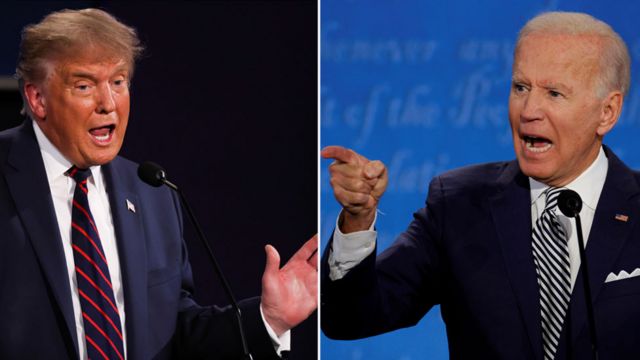Passions have been running high amongst Jews in Israel and the United States as the empire heads towards its most divisive and sensationalized presidential election in recent memory.
The fact that US Jews are overwhelmingly supporting former Vice President Joe Biden while many vocal Israelis are expressing hope that President Donald Trump wins a second term is indicative of a broader divide between the communities that has been exacerbated by several contentious issues in recent years.
What’s clear is that even beyond the Jewish community, the Trump presidency has so far radicalized many formerly apathetic US citizens by antagonizing several of the contradictions that have long been present yet dormant in American society.
From the perspective of the average American voter, this race is essentially between a candidate epitomizing a corrupt and broken system and the monster that said system produced (or in the words of longtime Batman fan Yehuda HaKohen, “a choice between the mafia and the Joker”).
While many Trump supporters subscribe to a conspiratorial narrative that allows them to see their president as a fearless reformer taking on a criminal political establishment that has been eroding the US for several decades, the truth is that he’s simply a symptom and ugly caricature of the system his supporters would like to see him challenge.
But Donald Trump isn’t a stupid man. In fact, he’s shown himself successful not only in business and entertainment but also in getting himself elected president. Yet he’s clearly unhinged and has the emotional maturity of a middle school bully, as has been displayed countless times through his thin-skinned narcissism and gross incompetence when dealing with an array of policy issues.
Trump’s incompetence has also found positive expression in the erosion of Washington’s imperial apparatus, something most clearly demonstrated by his administration’s botched attempted coups in Venezuela and Bolivia. By polarizing American society and its political landscape to the extent that he has, Trump has also accelerated the empire’s decay by fracturing the institutions and agencies responsible for implementing US foreign policy.
Joe Biden, on the other hand, epitomizes Washington’s neo-liberal political establishment that is completely beholden to corporate interests. If elected, he’ll likely bring the United States back to the course it was on before the systemic glitch called Donald Trump took office. A Biden administration would clearly take climate issues and the Covid-19 pandemic more seriously but it would also likely restore some stability to the power structure and foreign policy apparatus.
If Biden does in fact win, it’s crucial that all those Americans radicalized by the Trump years not go back to sleep but continue to organize and apply pressure for systemic change.
But whichever candidate wins will most likely be presiding over the empire’s further decline, especially given the current economic crisis. And if election results are at all contested, the United States might find itself dangerously close to civil war.
Before delving into how next week’s election can impact the State of Israel, it’s important to state unequivocally that no one should vote in a US election with Israel’s wellbeing in mind. What’s best for Israel is independence from the United States. Israel doesn’t need a sympathetic emperor. We need freedom.
That being said, it might still be worth analyzing potential scenarios for how Israel might be impacted by next week’s results.
On a superficial level, Trump clearly appears the more “pro-Israel” candidate. He has moved the US Embassy from Tel Aviv to Jerusalem, recognized Israeli sovereignty over the Golan Heights, marginalized the Fatah-led Palestinian Authority, taken a hardline stance on Iran, permitted US passports of citizens born in Jerusalem to state “Israel” as country of birth and vaguely accepted the legitimacy of some Jewish communities in the West Bank. He has also managed to help Israel secure normalized relations with the United Arab Emirates, Bahrain and Sudan, ostensibly without Jerusalem having to cede any territory.
Joe Biden, by contrast, served in the Barack Obama administration – deemed one of the most hostile to Israel in recent history – and has a long record of criticizing Israel’s presence in the disputed Samaria and Judea regions.
Opposition to Jewish communities in the West Bank is of course not exclusive to Biden or Obama. It’s been Washington’s consistent bipartisan policy for over 50 years. Trump was able to veer away from it slightly only because he’s independently wealthy and proudly self-identifies as an outsider to the American power structure.
But despite Trump’s openness to new positions on the territories, his two-state “Deal of the Century” still calls for Israel to surrender 70% of the West Bank to the PA, which the president plans to place under the leadership of Mohammed Dahlan.
So at the end of the day it should be clear that Israel will likely have to resist whoever wins next week’s presidential election. Therefore the real question we should be asking is whether a President Trump or President Biden will be easier for Jerusalem to resist.
Trump would likely be harder to resist, both because of his bulldozer personality and the notion that Israel – specifically Prime Minister Binyamin Netanyahu (Likud) – already owes him big.
The Israeli public, especially the national camp, generally views the Trump White House as having been friendlier than any previous administration. Israeli leaders are generally better at standing up to hostile US leaders than those ostensibly sympathetic. A second term Trump who already has a plan to partition the Land of Israel in place and feels Israel to be in his debt could potentially turn very aggressive in his demands for territorial concessions. And it’s doubtful Netanyahu would have the courage or will to stand our ground.
An openly hostile Biden who Israelis already see as a threat is far less dangerous than an ostensibly sympathetic Trump Israelis insist on calling a friend. Especially given the fact that Trump already has a plan on the table and the leverage over Israel to try forcing its implementation. In this regard, a Biden victory next week could buy Israel some time. A Biden administration would have to trash Trump’s plan and start from scratch, something that could potentially take years given the domestic crises his administration would first need to tackle.
But it should also be noted that a Biden victory might signal the end of Prime Minister Netanyahu’s time at Israel’s helm.
After throwing all his eggs in Trump’s political basket, Netanyahu knows that if Biden wins, his days as prime minister are likely numbered. The US has an ugly history of removing sitting Israeli prime ministers from office. Netanyahu himself was ousted from power by Bill Clinton in 1999 but survived a similar attempt by Barack Obama in 2015.
At a time when Israel seems to already be heading for new elections, destabilizing Netanyahu’s already shaky coalition wouldn’t take any serious effort for Biden. Weakening his Likud party’s election campaign should also be fairly easy in the current political climate. But there’s probably little Washington will be able to do to prevent Naftali Bennett (Yamina) from taking Netanyahu’s place.
According to polls, the Yamina leader is currently the most popular alternative candidate to lead the country, and his rhetoric indicates that he wouldn’t easily cooperate with Washington’s traditional two-state agenda (although many others with similar rhetoric have caved in the face of US pressure).
It’s unlikely that Washington will be able to find a viable Israeli candidate loyal to US interests and capable of challenging Netanyahu for the premiership. Biden’s most effective play under the circumstances might be to signal a readiness to orchestrate another soft coup but then offer Netanyahu an opportunity to prove his loyalty and remain in power.
In any case, regardless of who wins next week’s vote, the Israeli interest will be to transition as quickly as possible to an independent foreign policy and freedom from US economic and military dependency. Netanyahu likely knows this but, given his current legal and political battles, it’s unclear whether he has the strength or the focus to make the necessary moves to get Israel out from under Washington before the empire’s collapse.





